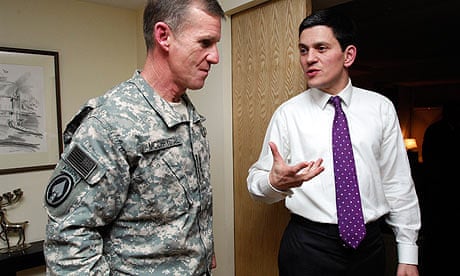The US military's surge in Afghanistan could counter a resurgent Taliban and pave the way for a political deal that could end the war, Nato's commander in the country said today, before a flurry of diplomatic activity to find a way out of the eight-year conflict.
The comments by General Stanley McChrystal indicate that Thursday's international conference in London will concentrate on ways to reach a political settlement with the Taliban.
"It's not my job to extend olive branches, but it is my job to help set conditions where people in the right positions can have options on the way forward," McChrystal told the Financial Times.
"I think any Afghans can play a role if they focus on the future, and not the past," he said when asked whether he would be content to see Taliban leaders in a future Afghan government.
Robert Gates, the US defence secretary, last week also held out the possibility of a deal with the Taliban when he described them as part of Afghanistan's "political fabric".
David Miliband, the foreign secretary, said efforts to stabilise Afghanistan had reached a decisive moment. Speaking as EU foreign ministers gathered in Brussels to discuss issues including Afghanistan, Yemen and Iran, Miliband said: "The combination of a new Afghan government and a new focus of the international military and civilian efforts means that this is going to be a decisive period in the Afghan campaign.
"There's a new government in Kabul, there's a new military strategy, there's a new civilian surge … it's very important that we get the political strategy right at this time."
Barack Obama is sending an extra 30,000 troops to Afghanistan to support the government of Hamid Karzai but has said that the US will begin to withdraw American forces next year. Most of the US troops are due to be in place by the end of August, along with several thousand extra soldiers from other countries who will boost the number of western troops in Afghanistan to 100,000.
The head of the UN mission in Afghanistan, Kai Eide, meanwhile, has called on Afghan officials to seek the removal of at least some senior Taliban leaders from the UN's list of terrorists, as a first step toward opening direct negotiations with the Taliban.
In an interview with the New York Times, Eide also urged the US to speed its review of the roughly 750 detainees held in its military prisons. Until late last year, the Americans were holding those prisoners at a makeshift detention centre at Bagram air base and refusing to release their names.
Eide said he hoped that the moves would eventually open the way to face-to-face talks between Afghan officials and Taliban leaders, many of whom are hiding in Pakistan.
"If you want relevant results, then you have to talk to the relevant person in authority," Eide said. "I think the time has come to do it."
Past efforts at compromise between Kabul and the Taliban, however, could not get past conflicting demands. The Afghan government has insisted that the Taliban abandon violence and sever ties with al-Qaida, while the Taliban have demanded that foreign forces leave the country first.
Before the London conference, held at the behest of Gordon Brown, Karzai is scheduled to meet the Pakistani president, Asif Ali Zardari, on the sidelines of a summit with Turkey. In the past, Karzai has accused Pakistan of not doing enough to stop the Taliban using Pakistan as a sanctuary from which to plan and launch attacks in Afghanistan.
Masood Khalili, Afghanistan's ambassador to Turkey, told the state-run news agency Anatolian the aim of the meeting was to "forge co-operation that might lead to reconciliation in the region. Everybody in the region is thirsty for peace."
Turkey is hosting a meeting of Afghanistan's neighbours tomorrow to seek a common approach to the conflict before the London talks, bringing together some 60 countries, including foreign ministers from China and Britain.
As the pace of diplomacy quickens, General David Petraeus, the head of US central command, warned that the fight in Helmand province would intensify before the situation improved. But echoing McChrystal, Petraeus told the Times there was a possibility that Afghan officials would hold reconciliation talks with senior Taliban and other insurgent leaders, perhaps also involving Pakistan.
